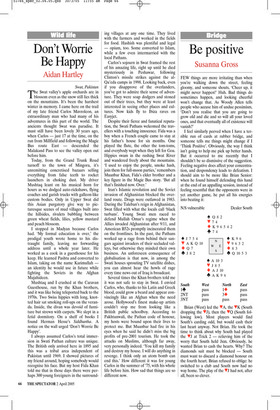Don’t Worrie Be Happy
Aidan Hartley
Swat, Pakistan
The Swat valley’s apple orchards are in blossom even as the snow still lies thick on the mountains. It’s been the harshest winter in memory. I came here on the trail of my late friend Carlos Mavroleon, an extraordinary man who had many of his adventures in this part of the world. The ancients thought Swat was paradise. It must still have been lovely 30 years ago, when Carlos — just 17 at the time, on the run from Millfield and following the Magic Bus route East — descended the Malakand Pass to see the valley open out before him.
Today, from the Grand Trunk Road turnoff to the town of Mingora, it’s unremitting concretised bazaars selling everything from false teeth to rocket launchers in choking dust. My driver Mushtaq leant on his musical horn for hours as we dodged auto-rickshaws, flying coaches and garish trucks with galleon-like custom bodies. Only in Upper Swat did this Asian purgatory give way to picturesque scenes of mud villages built into the hillsides, rivulets bubbling between green wheat fields, lilies, yellow mustard and peach blossom.
I stopped in Madyan because Carlos had. ‘My formal education is over,’ the prodigal youth wrote home to his distraught family, leaving no forwarding address until a whole year later. He worked as a cook in a guesthouse for his keep. He learned Pashtu and converted to Islam, taking on the name Karimullah an identity he would use in future while fighting the Soviets in the Afghan Mujahideen.
Mushtaq and I crashed at the Caravan Guesthouse, run by the Khan brothers, and it was like being teleported back to the 1970s. Two Swiss hippies with long, knotted hair sat smoking roll-ups on the veranda. Inside, the divan was devoid of furniture but strewn with carpets. We slept in a fetid dormitory. On a shelf of books I found Herman Hesse’s Siddhartha. A notice on the wall urged ‘Don’t Worrie Be Happy’.
I always assumed Carlos’s total immersion in Swati Pathan culture was unique. The British only arrived here in 1895 and this was a tribal area independent of Pakistan until 1969. I showed pictures of my friend around, hoping somebody would recognise his face. But my host Fida Khan told me that in those days there were perhaps 300 young foreigners in the surround ing villages at any one time. They lived with the farmers and worked in the fields for food. Hashish was plentiful and legal — opium, too. Some converted to Islam, while a few even intermarried with the local Pathans.
Carlos’s sojourn in Swat framed the rest of his amazing life, right up until he died mysteriously in Peshawar, following Clinton’s missile strikes against the alQa’eda camps in 1998. Looking back, even if you disapprove of the overlanders, you’ve got to admire their sense of adventure. They were soap dodgers and stoned out of their trees, but they were at least interested in seeing other places and cultures. Now kids fly to Ibiza raves on Easyjet.
Despite their fierce and fanatical reputation, the Swati Pathans welcomed the travellers with a touching innocence. Fida was a boy when a French couple came to stay at his father’s house for six months. One played the flute, the other the tom-toms, and everybody wept when they left for Goa. Hippies swam in the rushing Swat River and wandered freely about the mountains. ‘I used to enjoy the people, smoke hash, join them for full-moon parties,’ remembers Muanbar Khan, Fida’s elder brother and a key figure in the Magic Bus story. ‘But all that’s finished now. Over.’ Iran’s Islamic revolution and the Soviet invasion of Afghanistan blocked the overland route. Drugs were outlawed in 1983. During the Taleban’s reign in Afghanistan, Swat filled with what the locals call ‘black turbans’. Young Swati men raced to defend Mullah Omar’s regime when the Allies invaded Afghanistan after 9/11, and American B52s promptly incinerated them on the frontlines. In the past, the Pathans worked up a rage from behind their sangars against invaders of their secluded valleys, but otherwise they minded their own business. An unforeseen consequence of globalisation is that now, in among the Swati houses sprouting TV satellite dishes, you can almost hear the howls of rage every time news out of Iraq is broadcast.
Several times the Khan brothers told me it was not safe to stay in Swat. I envied Carlos, who, thanks to his Latin and Greek blood, could grow a beard and appear convincingly like an Afghan when the need arose. Hollywood’s finest make-up artists couldn’t stop me from looking like a British public schoolboy. According to Pakhtunwali, the Pathan code of honour, my hosts were bound upon their lives to protect me. But Muanbar had fire in his eyes when he said he didn’t miss the big profits of pre-2001 tourism. He took the attacks on Muslims, although far away, very personally indeed. ‘You kill my family and destroy my house. I will do anything in revenge. I think only an atom bomb can end this.’ How different it was for young Carlos in the summer of ’75, with his whole life before him. How sad that things are so different now.





























































 Previous page
Previous page